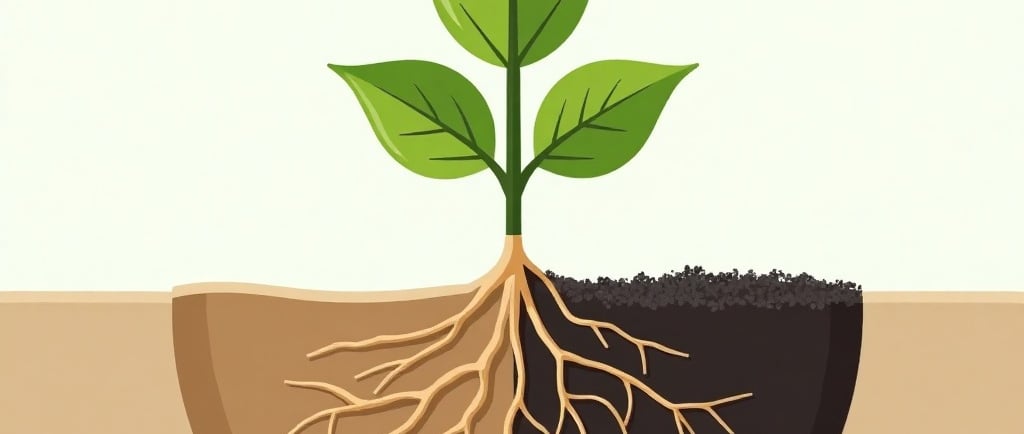Add your promotional text...
The Gardener's Secret Weapon: Using Biochar to Beat Drought and Salinity
Source & Further Information: The findings and concepts discussed in this article are largely based on the research presented in the following scientific paper: Wu Y, Wang X, Zhang L, Zheng Y, Liu X, Zhang Y. The critical role of biochar to mitigate the adverse impacts of drought and salinity stress in plants. Front Plant Sci. 2023 May 8;14:1163451. doi: 10.3389/fpls.2023.1163451. PMID: 37223815; PMCID: PMC10200947. We encourage readers interested in the detailed methodology and complete results to consult the original publication.
7/11/20254 min read


The Double Threat to Our Plants: Drought and Salinity
Every gardener and farmer knows the stress of a dry spell. Drought is a major threat to agriculture and global food security, causing everything from wilting leaves and reduced photosynthesis to complete crop failure. When water is scarce, plants go into survival mode, closing up the tiny pores on their leaves (stomata) to conserve moisture, which in turn chokes off their ability to "breathe" in carbon dioxide for growth. Internally, this stress creates harmful molecules (Reactive Oxygen Species or ROS) that damage vital cell components.
But there's another, sneakier threat that often goes hand-in-hand with drought: salinity. As water evaporates from soil, it leaves salts behind. Over time, due to factors like salty irrigation water, fertilization, and climate change, these salts can build up to toxic levels. It's estimated that by 2050, half of all farmable land could be damaged by high salinity!
Salty soil creates a "pseudo-drought" effect, making it harder for plant roots to absorb water due to osmotic pressure. It also throws the plant's nutrient balance out of whack and, just like drought, leads to a damaging overproduction of ROS. To ensure we can keep growing food for a hungry planet, we need effective ways to combat both of these twin threats. Enter an ancient solution with modern promise: biochar.
What Exactly is Biochar?
At first glance, biochar looks like simple charcoal. But while they look similar, their purpose is different. Biochar is a carbon-rich material created by heating organic matter—like wood chips, crop residues, or nutshells—at high temperatures in an oxygen-limited environment, a process called pyrolysis.
The result is a remarkably porous, fine-grained material that acts as a powerful soil conditioner. Think of each tiny piece of biochar as a microscopic sponge. Its incredible network of pores gives it several unique properties:
It holds onto water, making more moisture available to plant roots.
It provides a luxury home for beneficial soil microbes, which in turn improve soil health.
It can hang onto nutrients, preventing them from being washed away and keeping them available for plants.
The exact properties of biochar depend on what it's made from (the "feedstock") and the temperature of the pyrolysis process, but its potential to improve soil health is enormous.
How Biochar Helps Plants Beat the Drought
When added to soil, biochar becomes a powerful ally for thirsty plants in several ways:
Improves Water Retention: Its sponge-like structure directly increases the soil's water-holding capacity. This means more water is available to the plant for longer periods after rain or irrigation. Studies show biochar-amended soil helps plants maintain better water status (Relative Water Content or RWC).
Enhances Nutrient Uptake: By improving the soil's Cation Exchange Capacity (CEC), biochar helps the soil hold onto essential nutrients like potassium, calcium, and magnesium, making them readily available for the plant to absorb even under stress.
Protects Photosynthesis: By keeping the plant better hydrated and nourished, biochar helps protect the vital process of photosynthesis. Plants in biochar-amended soil often show higher chlorophyll levels, better stomatal conductance (the opening/closing of leaf pores), and overall improved photosynthetic efficiency.
Strengthens Defenses: Biochar helps plants better manage their internal stress responses. It can strengthen antioxidant systems that "mop up" the harmful ROS molecules produced during drought, protecting cells from damage. It can also help maintain a healthier balance of plant hormones.
Improves Overall Growth: The combined effects of better water, more nutrients, and reduced stress lead to tangible results: increased leaf area, stronger root systems, and ultimately, better plant growth and crop yields.
How Biochar Fights Back Against Salty Soils
Biochar's benefits are just as impressive when dealing with high-salt conditions:
Reduces Sodium Toxicity: One of the biggest problems with salinity is an excess of sodium (Na+), which is toxic to plants and disrupts their ability to take up other crucial nutrients like potassium (K+). Biochar can directly adsorb (bind to its surface) a significant amount of Na+ ions, locking them away so they are less available for the plant to absorb.
Improves Nutrient Balance (The K+/Na+ Ratio): By both reducing Na+ uptake and improving the retention of beneficial ions like K+ and Calcium (Ca2+), biochar helps maintain a healthier nutrient balance inside the plant. A good K+/Na+ ratio is critical for plant health under saline stress.
Maintains Water Relations: Just like with drought, biochar improves the soil's water-holding capacity, helping to mitigate the "pseudo-drought" effect caused by high salt concentrations. It helps plants maintain better internal water pressure and stability.
Protects Photosynthesis & Defenses: Similar to its role in drought, biochar helps protect photosynthetic machinery and boosts antioxidant systems to fight the oxidative stress caused by salinity.
The Future is Bright, But More Research is Needed
Biochar isn't a silver bullet. Its effectiveness can vary depending on the type of biochar, the soil it's applied to, the plant species, and the application rate. However, the evidence is clear: this "black gold" is a powerful, eco-friendly tool that can significantly improve soil health and bolster plant resilience against the dual threats of drought and salinity.
As we look for sustainable solutions to improve our agricultural systems, biochar stands out as a promising amendment. More research is needed to create specific guidelines and models for its use, but it holds incredible potential to help us reclaim damaged soils, conserve water, and secure our food supply in a changing climate.